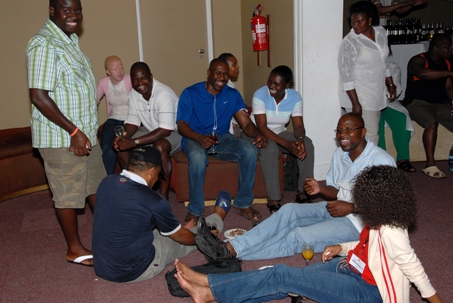 |
Summer school
students bring energy and enthusiasm: A group
of the PDM students relax at the summer school opening
function at the HB Thom theatre on 14 January this
year. the function, which featured a performance of
the Africa Institute's educational mini-musical Lucky
the Hero! as well as musical performances, was
a new addition to the programme. The rest of the programme
included lectures on different aspects of HIV and
AIDS and fun activities in the surroundings of Cape
Town. |
Knowledge and positivity no match for HIV/AIDS
The PDM and MPhil programmes are the most comprehensive
HIV and AIDS training programmes in the world – a
good reason why the Africa Centre takes so much pride in
the prestigious academic programmes and the students. But
the road is not over when the students graduate. The real
value of these programmes becomes evident when they use
their newly acquired knowledge and skills in their workplace.
Greg Munro is one of the past students who are making a
difference.
You are currently working as the Senior Regional Capacity
Development Manager for East Africa TSF, the technical support
facility for Global Fund grants set up by UNAIDS. Can you
tell us more about your job and the background to it?
With the rapid rise in international funding for HIV, UNAIDS
facilitated the establishment of technical support facilities
(TSFs) to respond to the growing demand for short term quality
technical assistance to scale up HIV and AIDS responses.
There are five TSFs, including Eastern Africa (managed by
the African Medical and Research foundation, AMREF) and
Southern Africa (managed by a private sector organisation).
The TSF Eastern Africa is based in Nairobi and serves Kenya,
Uganda, Tanzania, Rwanda, Ethiopia and Eritrea. It provides
services to national AIDS coordinating authorities, health
and other ministries, in-country Global Fund partners, civil
society organisations and private sector implementers.
Focus areas for support include topics such as strategic
and operational planning, monitoring and evaluation, mainstreaming
of HIV, organisational development, and costing and budgeting.
In order to provide these consulting support services, the
TSF has a pool of skilled regional and international consultants
in the HIV planning, implementation and evaluation field.
In order to ensure that every country and the consultants
operating in the country are kept up to date with rapidly
changing dynamics, to ensure that countries can plan, anticipate
and manage technical assistance needs and to develop and
expand regional capacity (not always reliant on international
capacity), a capacity development unit exists within the
TSF, headed by myself.
My main tasks are to:
• Design and manage a comprehensive capacity development
programme across the region
• Design and manage a country partner capacity development
programme for implementers of Global Fund grants
• Strengthen the client-consultant relationship
• Design and manage a professional skills development
programme for consultants
• Manage and mentor consultants and staff in the TSF
development unit
• Quality assurance, networking and marketing
What do you enjoy most about your job?
The most enjoyable part of the job is imparting knowledge
and skills to local role players. There is often a heavy
reliance on international “experts” in Africa,
and as a citizen of Africa I am proud to use my professional
energy in trying to build our own capacity. The skills obtained
in the MPhil course influence my approach to my position
and the tasks I am responsible for.
What is your experience of the HIV/AIDS situation and how
it is handled in Eastern Africa?
Eastern Africa is further down the natural history road
of the epidemic, so they have lower prevalence rates today
than was the case earlier. I personally find their approach
to the epidemic to be mature with very overt leadership
in the HIV field. Organisations and governments are very
supportive of capacity building efforts.
What do you think are the most urgent issues regarding
HIV that needs to be addressed?
The biggest challenges facing HIV in Africa are the mismatch
between increased donor funding and in-country systems,
i.e. country health systems are not always geared to manage
large amounts of funding. We need to develop in-country
systems as an integral part of donor funded HIV programmes
to ensure longer term sustainability.
Another area is the development of civil society organisations
to share the implementation burden with government (an excellent
example of this is Zambia). Mainstreaming HIV into all government
services remains a poorly understood and implemented concept
and also needs further input. Finally, given the training/capacity
development component of my job, I hope to maintain contact
with the Africa Centre in the future.
It is people like Greg who makes all the planning, preparation
and research of the academic programmes worth it. He is
an inspiration to many and the Africa Centre is proud to
be associated with someone who is so positive and motivated
to tackle and triumph over the pandemic.
• If you wish to contact Greg, you can email him
at greg@sybaweb.co.za
|